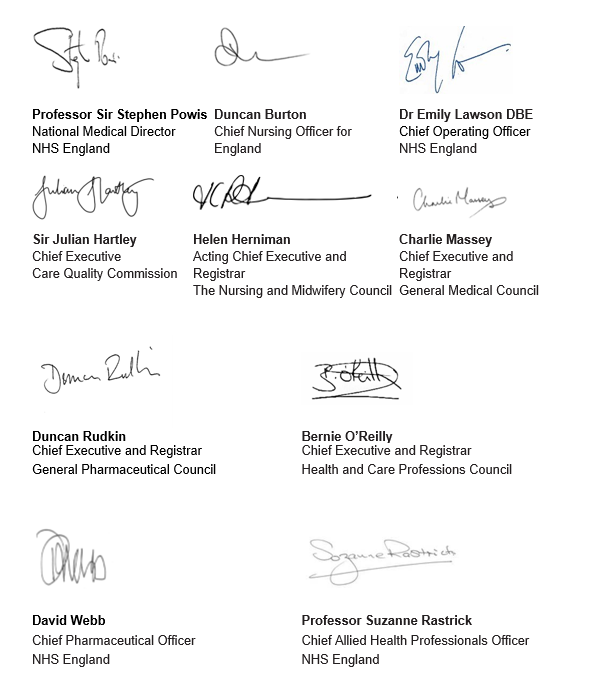Read our joint letter with NHS England, the Care Quality Commission, the General Medical Council, the CNO for England, the General Pharmaceutical Council and the Nursing and Midwifery Council on how we’re supporting professionals this winter.
Dear colleagues,
Thank you for all you and your teams have done and continue to do for patients, families, local communities, and all those receiving care as we embrace another busy winter.
The past few winters have been difficult, and we expect this one to be similarly challenging. We understand that delivering care in a pressured environment can mean working in different ways and at times departing from established procedures to provide the best care possible for patients and people receiving care. This can be challenging, but it is vital that we have a whole system approach to risk across all urgent and emergency care (UEC) pathways to provide the best outcomes for our patients as well as maintaining elective activity where capacity allows.
This will require engagement and close collaboration with and between senior leaders to make the necessary changes to ways of working that support patient flow. We recognise there are pressures in all settings across the entire system and it will require action across primary, community and secondary care as well as mental health to help improve flow and reduce pressures on emergency departments. To achieve a balance in supporting UEC and elective flow, consideration will need to be given to surgical and Community Diagnostic Centre (CDC) capacity and to how staff are able to support patients in the best way.
As ever, one area of focus will be avoiding delays in handovers from ambulance services to emergency departments, ensuring ambulances are released to respond to the next patient. As you are aware, there is a strong correlation between ambulance handover delays and ambulance Category 2 response delays. Additionally, there are patients experiencing excessive waits (over 12 hours) and we need to ensure flow through the hospital and appropriate discharge to improve this.
We are confident all clinical colleagues will continue to respond and perform their duties professionally, informed by our respective professional standards across primary, community and secondary care as well as in mental healthcare.
As we did last year, we recognise this challenging situation and the dilemmas involved. Patient safety is, as always, the absolute priority for all staff within the multiprofessional NHS team, and that needs to be factored into any decisions about how best to manage and support patients and other service users.
Your professional code, standards and principles of practice are there to guide and support your judgments and decision-making in all circumstances. This includes considering local realities and the need to adapt professional practice at times of significantly increased pressure. All health profession regulators will keep regulatory oversight proportionate at this busy time, taking context into account, while maintaining the focus on patient safety and protection of the public. The refreshed document Principles for assessing and managing risks across integrated care systems (formerly called the Dynamic Risk Assessment Framework) which was recently published provides advice, and there are the principles for providing safe and good quality care in the temporary escalation spaces document which supports staff to provide the safest most effective and highest quality care possible for all patients wherever they are situated.
It is the responsibility of all providers commissioned by the NHS and healthcare leaders to ensure that all clinicians working in their organisations are supported, and that channels for raising and acting on concerns remain open and accessible to all staff. Your professional code and duty of candour are there to support you to speak up where necessary, in the best interests of the public and people receiving care.
It is also essential that you look after your own health and wellbeing during this period. Asking for help from others when you need it is good professional practice, so we ask that you seek support from your organisation if you need it as well as supporting one another.
Please keep encouraging all eligible frontline team members to come forward for their winter covid and flu vaccines. This will not just protect them and their families but will help reduce sickness absence over the winter period.
Finally, thank you again for the large amount of work that has already been done to prepare for winter, whether you are providing direct care, supporting colleagues, or leading other services and teams across healthcare, all contributions are essential components of providing the best possible support and care to the communities we serve.
Yours sincerely,


